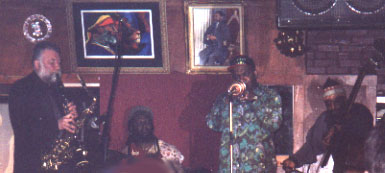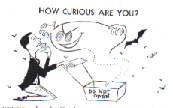Peter Brotzmann Lives in
His Die Like a Dog Quartet
by Jeff Bagato

Peter Brotzmann and Die Like a Dog,
Mr. Henry's, Adams Morgan, WDC, April 18, 2000.
Almost 30 years later, Brotzmann paid homage to Ayler's influence on the Die Like a Dog quartet's 1994 debut on the German FMP label, quoting Ayler's tunes but mostly referencing his unfettered musical approach, showing what it had become in the hothouse of jazz's never-ending improvisational dialog between players. The group name came from a short Ayler tribute article Brotzmann penned, a reference to the tragic neglect that ended Ayler's life. Die Like a Dog is fake breitling watches a free jazz dream team of bassist William Parker, drummer Hamid Drake, and trumpeter Roy Campbell--all strong players that Brotzmann's worked with in various contexts over the past 20 years. The quartet plays hard, certainly, but doesn't trade a bit of complexity or passion for the heavy hitting. Their jams are sprawling, epic, and ferocious and cover tremendous dynamic ranges.
"I always thought that jazz is not only of the spirit but of the body, too," Brotzmann says carefully. "I always like to play to an end where you don't know where you are anymore. Where the physics have to give up, in a way."
Brotzmann's recipe for his method includes Shoenberg and Webern, the Fluxus art movement, and the political climate of the 60s when he first gave up his art studies for music. "And maybe especially for us Germans," he adds, "just trying to get rid of what our fathers had done during the second world war." But Brotzmann's music really caught fire when these intellectual, European ingredients were exposed to American free jazz, like Ayler's. Ayler linked the analysis and intensity of free improvisation with the passion of spirituals, creating ecstatic cries destined to be largely overlooked in their day. "[Ayler] had a way of praying his music, the way of being a preacher," Brotzmann puts it. "I admired that very much. It really hit my soul."
Brotzmann himself tends to play dense, fast-moving lines, discarding harmonic elements in favor of darker, deeper statements. Yet on some pieces, like the "Encore" from last year's live CD "From Valley to Valley" on Eremite Records, Brotzmann's sax eruptions open up gradually to more lyrical phrases--a rare enough thing for him that invention rolex critics have pointed it out. "That's a very simple thing," Brotzmann says of his lyrical moments. "I don't need harmonics, but if somebody else needs it, I like to play it. But for me, my way of thinking is from note to note, from special line to special line. We don't need harmony to make music. We are able to create different methods of music."
Brotzmann's special fire was there from the start. The sax explosion kicking off "Machine Gun," his 1968 debut with an octet of now-famous European improvisers, generated an instant myth of a wild player. Brotzmann came to greater prominence in the United States in the late 80s, as Last Exit--with bassist Bill Laswell, drummer Ronald Shannon Jackson, and late guitarist Sonny Sharrock--pioneered a blend of heavy metal and free jazz and earned a reputation as an intense, hardworking, if unlucky, live band.
Brotzmann's style is now a given. What's surprising is that he's survived. At 59, he's still "traveling like an replica hublot idiot" with Die Like a Dog, the Chicago Tentet, and other groups.
On his tours, he's often reminded of his influences. "The last time
I was playing in Atlanta, I went to a church service in the black community,
and I saw this man preaching and I saw this passion I talked about with
Ayler," he says. "I can't do the same; my sources and my roots are different,
but you can have the same passion. If you do something, and you're really
convinced about what you're doing, you have to do it as good as you can.
Otherwise, it's not worth opening the case of the horn."
END
Read an interview with Peter Brotzmann discussing Albert Ayler, Die Like a Dog, Last Exit, and other aspects of his career.
[This article originally appeared in The Washington Post Weekend
Section, April 14, 2000.]





